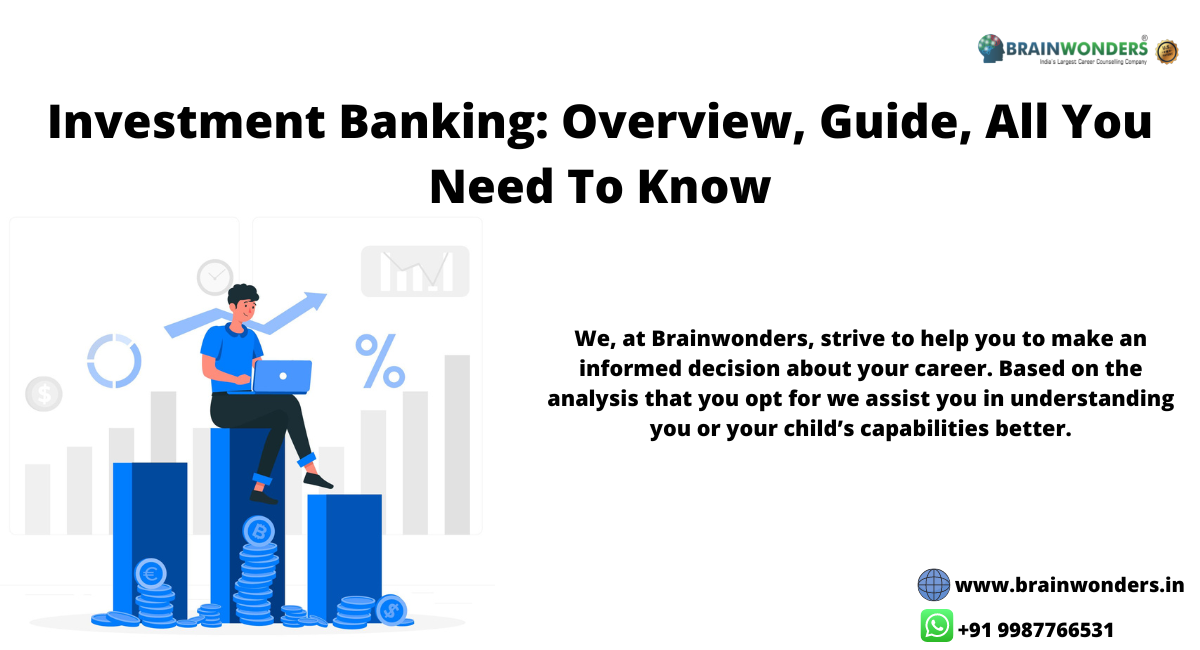

We have a database of over 11,000 colleges all over India.
Connect with us to find your perfect fit!
Blog
04 February,2023 | By Brainwonders

How to get into Investment Banking? How can I kickstart my career in Investment Banking? Well, investment banking is a vast field; one should have a passionate interest in investment along with banking and finance. In this blog, we have provided you with the necessary information about investment banking, which is essential if you are among those students who are looking to find out the best route to enter the investment banking field.
Visit Brainwonders Career Counselling if you are still unsure about what field or degree to choose. If you're interested in learning about your potential insights that might help you succeed and advance in your career, get in touch with Brainwonders. To Know more, click on the below link, Brainwonders- India's Leading Career Counselling Firm.
Table of Content:
Visit Page: What is DMIT Test? How can DMIT Test be helpful in shaping one's Career - Brainwonders
Investment banking (IB) is a unique banking industry which pertains to the wealth development of specific businesses, institutions and governments. Thus, investment banking is a segment of the financial service sector that assists and monitors organisations, governments and institutions with raising capital through Initial Public Offerings and conducting transactions such as mergers and acquisitions.
Investment Bankers assist the customers in raising funds in the capital financial market through the sale of stock or insurance of debt in their business. This position involves supporting clients with mergers and acquisitions and advising them on investment options.
Additionally, Investment Bankers are responsible for analysing the businesses and investment options to identify which ones are the most likely to be the safe investment. They may be in charge of supervising investment acquisitions or transactions as part of their duties. Furthermore, they regularly monitor their customers' investments to ensure they are operating as intended.
Visit Page: What is IQ Test? How to take an Online IQ Test? - Brainwonders
There are 4 pathways through which one can get a job in investment banking.
This is one of the best routes to start your career journey, but you have to decide early and pursue your career in investment banking. It will be easy for undergraduate students to get into investment banking, as many undergraduate finance students are indulging themselves in starting a career in Investment Banking.
Some graduate students accept the job role related to investment banking, such as corporate banking or corporate valuation, and then start their career progress in IB. The possibility of this route depends mainly on the market conditions and the nature of the job role. If your full-time job has nothing to do with finance, you must consider doing a master's in Finance or MBA in Finance.
If you are interested in starting a career in Investment Banking, and if your full-time job has nothing to do with finance, you will probably have to apply for an MBA program, which will alternately help you start a career in IB.
If you have more than 10 years of experience and are now a mid-level executive at a company, you will not have a good chance of breaking into IB at the Analyst, Associate, or VP levels. If you're in this situation, you'd be better off exploring non-IB positions or moving to a senior executive position and then attempting to move into finance from there.
The most recommended pathways are the first 3. After completing the undergraduate degree, one can pursue the investment banking course within 1-2 years of university graduation or at the MBA level.
Apart from the mentioned pathways, you will also have work and leadership experiences demonstrating your interest and commitment to investment banking.
Visit Page: What is Aptitude Test? How to take an Online Aptitude Test? - Brainwonders
Working in Investment Banking often requires numerous skill sets to meet its client's specific demands. Alongside having robust Excel, financial modelling, technical finance skills, and PowerPoint skills, it's crucial to have the soft skills. Below are some of the hard and soft skills that will help you excel in this field.
Soft Skills:
Hard Skills:
Visit Page: What is Personality Test? How to take the Personality Test? - Brainwonders
| Position Title | Typical Age Range | Base Salary (USD) | Total Compensation (USD) |
Time Frame For Promotion |
| Analyst | 22-27 | $100-$125K | $150-$250K | 2-3 years |
| Associate | 25-35 | $175-$225K | $300-$550K | 3-4 years |
| Vice President (VP) | 28-40 | $250-$300K | $500-$900K | 3-4 years |
| Director / Senior Vice President (SVP) | 32-45 | $300-$350K | $800-$1,200K | 2-3 years |
| Managing Director (MD) | 35-50 | $400-$600K | $1,000-$3,000K+ | N/A |
IB Analyst
This is the initial designation in the field of investment banking. After completing the internship with the bank at the end of the academic year at the institution, you are eligible to receive a full-time offer as an IB Analyst. The analyst works on valuing companies, creating models, accounting, accumulating pitch books, etc. Analysts are well known for working 80-100 hours per week even though the pay is excellent.
IB Associate
You can break into IB as an associate if you have worked in finance for several years and attended a business school for an MBA. If you stay with the bank for the third year as an analyst, you may be promoted to associate immediately from an analyst. As an associate, you will be responsible for coordinating the work of the analysts in order to satisfy the vice president's expectations. Associates work as much or slightly less than analysts but are compensated more.
IB Vice President
Vice Presidents are the ones responsible for managerial work starting to kick in. In this profession, you must ensure that your work is related to what Senior Vice President and Managing Directors want. There is a lot of interaction as well as negotiation required in order to fulfil the client's requirements. Sometimes, IB Vice President is also called 'Director'.
IB Senior Vice President
This is essentially a hybrid of vice president and managing director. The emphasis is on deal execution and client connections, and what you perform will be determined by the needs of the group at the moment. Also referred to as an 'Executive Director.'
Managing Director
The highest level you can achieve within a bank without becoming a group head or higher is MD (CEO, CFO etc.). Almost all of an MD's time is devoted to client relations and client acquisition.
Recommended Read:
Fill the form to know how!
_Course,_Admission,_Fees,_Salary,_Duration,_Syllabus,_Colleges.png)

